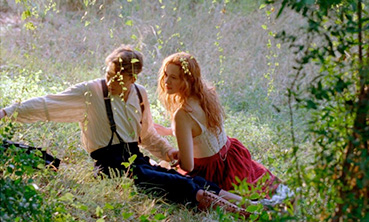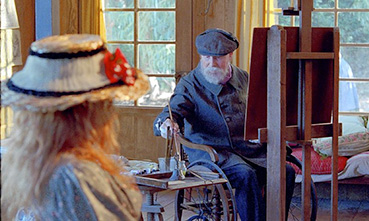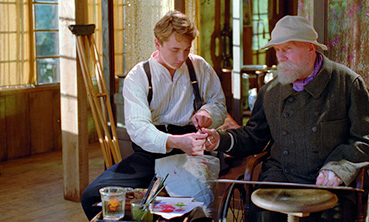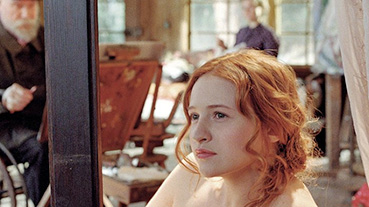|
In the summer of 1915, Jean Renoir returned home from war to a farm on the Côte d'Azur named Les Collettes, temporarily retired from service by the bullet of a Bavarian sniper. In his home he found his father, Pierre-Auguste Renoir, betwixt his seventy-fourth and seventy-fifth year, more withered than when he had left for the front, his hands bandaged and requiring frequent bathing. The older Renoir's arthritis had him bound to a wheelchair, but the man remained a fixture of the neighbouring grasslands and skirting stream, once described by his son as "a part of the landscape." One memorable moment in Gilles Bourdos' pastoral and plaintive film sees the farm's maids carrying Renoir downriver as if he were an aging Roman Emperor.
It is this summer which Renoir takes as its setting, and its circumstances as plot. Shortly before the arrival of Jean, a copper-haired young woman named Andrée Heuschling offers herself to the artist as a model, but to the Renoirs (cripples learn to walk again in her presence) she becomes a muse; offering a dying man his final burst of inspiration, and inspiring in his junior the passion for an all-new art form.

A trickling triptych of stories follow Renoir's (Michel Bouquet) artistic renewal in the bosom of Dédé (Christa Theret); his blossoming relationship with Jean (Vincent Rottiers) after the trauma of war; and the son's sexual coming-of-age with his father's subject. Each are deserving of their own film, so the question must be whether or not Bourdos balances and draws each of them to a satisfying conclusion. Arranging his concurrently ambling arcs in such close proximity they mingle without complication, the entirety of the action takes place in only three locations: the garden where both Renoirs, Dédé, the maids and children enjoy afternoon picnics; the dining and living room where most conflicts take place (suggesting that liberation can only be found outdoors); and Renoir's shack, where he first paints Dédé. If the themes and characters were better matured, this carousel of tableaux might even earn comparison with the work of Éric Rohmer.
But films like Claire's Knee can only feel so wispy when underpinned by a sturdy dramatic framework. Rohmer's genius lay in intricate and carefully plotted tales simply told. His characters are so strong, an audience never breaks from their conflict to recognize the complexity of the composition they exist in. Bourdos is a fine scene-setter, but his framework is emaciated, unmindful of detail, and as a result his film feels lethargic rather than languorous.
Not that Renoir isn't palpably beautiful, and its sluggish pace at least allows us to inhale the pollen-flecked summer air, so well evoked by DP Ping Bin Lee. Like van Gogh's self portraits in Vincente Minnelli's Lust For Life, Renoir's landscapes of Les Collettes have suffused themselves into the film's flavoursome fabric, ensuring that the artist's presence is felt even when he remains off-screen. Bourdos' delivery of this idea is nowhere near as authoritative as Minnelli's, but effective enough in attaching us to the one-note character of the script.

Hiring convicted French art forger Guy Ribes as Renoir's hand can't cover Bourdos' not being sure enough. Scenes of the artist painting feel authentic but the off-centre framing only draws attention to the fact that the hand on-screen doesn't match Bouquet's hand so often seen in close-up being bathed by maids.
This disconnect extends deeper into the characterisation, and while those unfamiliar with Renoir, his life and beliefs, may not find the depiction here too quarrelsome, neither are they likely to find it fully satisfying, such is the screenwriter's fondness for having the old master recite fortune cookie clichés like some owlish geriatric. Those better acquainted will surely find much of the ‘detail' erroneous.
The film is not adapted from one single source, but Jean's 'Renoir, My Father' seems to be the most quoted, and likewise discoloured. This account of Renoir's life is written with great tenderness by his son, every page revealing new shades of an increasingly complex figure. Renoir takes a sharp one-eighty when it comes to acknowledging the greyer shades, such as Renoir's sometimes demeaning attitude toward women, opting for a more straightforward portrait whose dialogue is grossly reductive when compared to Jean's text.

The autobiography tells of how Renoir despised intellectualism, and the film makes the same point by lumbering Bouquet with cod-profound non-sequiturs, which the actor delivers with great conviction. Overstatement serves the purpose of creating antithetical contrast between father and son but the simplification is anathema to the man on record.
Renoir famously despised any activity that forced man to destroy. In his memoir, Jean remembers long conversations with his father about the futility of war, and the sadness and destruction it caused. Renoir's was a worldview based on emotion, not politics or social strata. Riddled with arthritis in his last twenty years, the ability to articulate all of life's wonders on a canvas took on a profound urgency. The last decade of Renoir's life was also his most productive, a time when the need to create became consumptive, a way of communicating where language and intellectualism had failed. Bourdos' film lacks that sense of urgency and passion, a sense of the act of creation becoming as essential as breathing. Jacques Rivette's La belle noiseuse, expresses this notion with a rush of intensity Renoir can't match. Brief scenes are smoothly edited and visually sumptuous but move without purpose.
Bouquet's physical portrayal of Renoir is the picture's most impressive asset. While he's too flushed to fully capture the man described by Jean as "shrunken", the actor persuades us of the same spirit captured in the memoir's pages. Jean describing his father's eyes, their look of "tenderness mixed with irony... merriment and sensuousness", is exactly what's reflected in Bouquet's eyes throughout the film, revealing more layers than the words ever could (especially in this screenplay). In scenes with Theret his performance really comes alive, and the young actress (best known for her work in 2008's LOL, recently given an American spit 'n' polish with Miley Cyrus in 2012) is captivating. The much younger but similarly soft-spoken performer is an equally magnetic force and there's really little need to focus on her nudity quite as much as Bourdos does. Frequently without clothes the actress composes herself elegantly, her expressive features drawing as much attention above her neckline as the frame often does to her naked torso. Never crossing into exploitation, it feels like something Theret must've absorbed from her model mother, rather than Bourdos' direction.

The weak link is Rottiers, whose Jean is plain and a little wooden. It's a performance constrained by very actorly mannerisms, the cogs working behind his eyes belonging to the actor, not the character. In his defence He's given little to do, but he's the only actor here unable to work above his material, as even little Thomas Doret (The Kid With A Bike) does in his brief but memorable scenes as Coco Renoir.
There's not too much wrong with Renoir but such extraordinary artistry never felt ordinary. Pleasant like a crisp autumn breeze, memory of the film passes just as suddenly. For its lack of detail, the disconnect between setting and theme, and the poor screenplay it joins the ranks of recent by-the-numbers French biopics like Coco Before Chanel and Gainsbourg, positioned for importance but unaffecting. Great films about artists are sadly rare, and despite its spirited performances, alongside Peter Watkins' Edvard Munch Maurice Pialat's and Van Gogh, Renoir can't bear comparison.
|